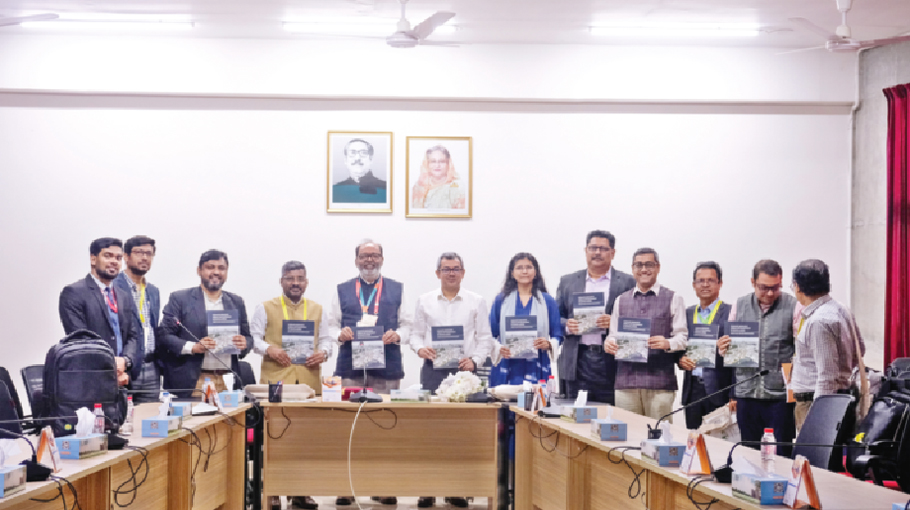‘Pay more focus on climatic risk, climate science in urban dev’

Centre for Participatory Research and Development (CPRD) on Tuesday organized a seminar titled "Climate Resilient Urban Development in Bangladesh: Policy Gaps and Recommendations in the capital Dhaka.
The program was organized as a part of the 7th UIU International Conference on Sustainable Development, said a press release.
United International University hosted the event.
Md. Shamsuddoha, CPRD's Chief Executive presided over the function. The event also featured by various discussants including Partha Hefaz Shaikh , Director, Policy and Advocacy of the Water Aid Bangladesh; Mohammad Zobair Hasan, Deputy Executive Director, DORP; Prof. Dr. Ahmad Kamruzzaman Majumder, Chairman, Department of ENV of Stamford University; Khodeja Sultana Lopa, Country Director of Diakonia; Shahnawaz Whara, Regional Climate and Resilience Advocacy Manager, Practical Action; Md. Jubaer Rashid, Country Representative, ICLEI, Bangladesh; and Md. Atiqur Rahman Mollick, Environment Specialist, Onushandhani Creeds Limited; among others.
Numerous Civil Society Organizations (CSO) representatives actively participated, contributing ondiverse perspectives.
The seminar unveiled research findings, presented by CPRD’s Research and Advocacy Officer, Naznin Sultana, and Research Assistant Elmee Tabassum, offering insights into the current state of climate-resilient urban development in Bangladesh, focusing on the crucial thematic areas of mitigation, adaptation, and inclusiveness.
The policy research findings shared in the seminar was intended to identify the status quo of climate-resilient urban development in Bangladesh through three thematic lenses- Mitigation, Adaptation, Inclusiveness. Intensive scrutinizing of policy literature revealed that although there are numerous existing policies, implementation of which is inhibited by myriads of challenges.
The study findings suggested some key recommendations and scope of CSOs advocacy which through a collaborative effort by CSOs can be carry forwarded to address pivotal challenges and enhance climate-resilient urban development in Bangladesh. The seminar underscored the imperative need to bridge the research and data gap in urban climate change resilience through the adoption of tools like the City Resilience Index and Climate Resilience Measurement for Community.
The recommendations also highlight strategies for mitigating budgetary constraints in municipalities, advocating for pro-poor support, promoting inter-ministerial coordination, and fostering community participation in planning processes. The seminar also emphasized the urgent exploration and fortification of secondary urban towns to alleviate the burden on megacities and facilitate a sustainable and resilient urban future in Bangladesh.
Md. Shamsuddoha stated that every policy should be made and implemented considering a climate change angle in it. He asserted that urbanization always occurs centering existing city areas, so the city areas face an extra load of population which in turn causes these people to live in substandard living conditions. He also emphasized the importance of nurturing secondary cities for residing growing numbers of internal climate migrants of Bangladesh. He urged the CSOs to advocate for filling up existing gap in policies so that urbanization becomes inclusive, climate resilient and contributeto mitigation.
Mohammad Zobair Hasan pointed out that while there is anabundance of documents and evidence, what is urgently needed now is action. He strongly advocated for active involvement of the people from a policy standpoint.
Professor Dr. Ahmad Kamruzzaman Majumder suggested reassessing mega projects considering climate change concerns in major cities. He also noted a significant deficiency in the interconnection between existing policies.
Partha Hefaz Shaikh highlighted the lack of public involvement in policy and advocacy efforts. He stressed that while Dhaka city is frequently addressed in policies, other significant cities are often overlooked. His primary recommendation was for CSOs to collaborate closely with the government, with a specific focus on allocating budget resources forpolicy implementation.



